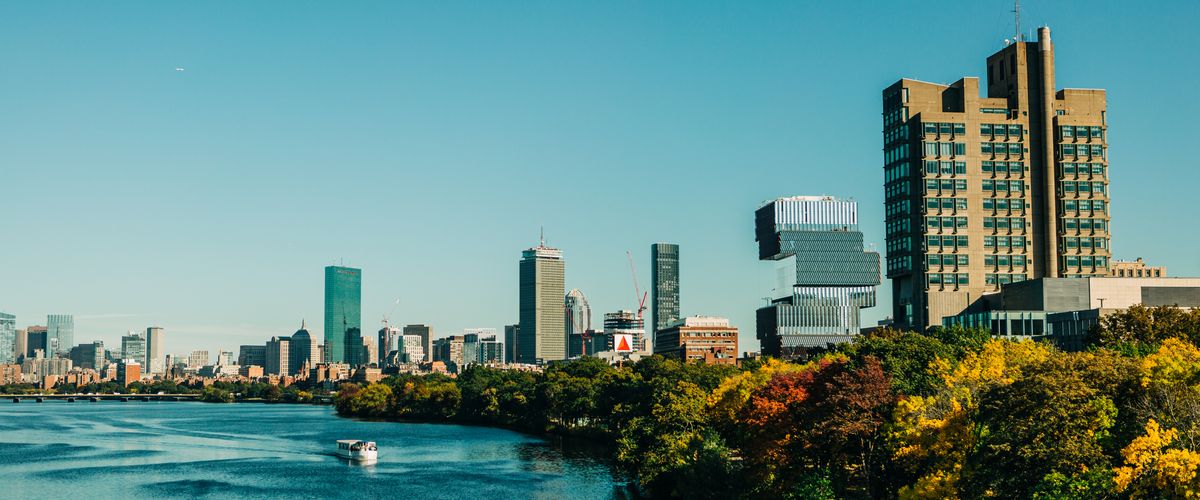As part of the Climate Action Plan, BU’s climate action work is directly tied to the City’s, and that collaboration is essential. By sharing best practices with the community, Boston University is helping the University, City, and broader region achieve their climate targets.
Boston Green Ribbon Commission
As a member of the Boston Green Ribbon Commission, Boston University President Robert Brown chairs the Higher Education Working Group. This working group’s primary focus is implementing a five-year strategic plan and sharing knowledge to advance climate action in the city and region.
BU’s Director of Sustainability, Lisa Tornatore, brings her expertise in climate action planning and implementation and serves as a coach for a cohort of higher education and cultural institutions through the Green Ribbon Commission’s Collaborative Climate Action Planning program. As a coach, she helps other local sustainability leaders on their journeys to implement climate action plans at their institutions and organizations.
Dennis Carlberg collaborates with Jacob Glickel, Northeastern University’s Director of Sustainability Operations, as staff co-chairs of the Green Ribbon Commission’s Higher Ed Working Group. They have been leading the higher education sector’s comments supporting the development of Boston’s Building Emissions Reduction and Disclosure Ordinance (BERDO) as the regulations have evolved through the public process. Specific regulations developed in 2022 include: reporting, verification, the Review Board, emissions accounting, and renewable energy purchasing.
Development of BERDO 2.0
In 2022, the City of Boston amended and replaced the initial version of BERDO, now known as the Building Emissions Reduction and Disclosure Ordinance. The BERDO program requires owners of large buildings in Boston to report their annual energy and water use to the City and reduce their greenhouse gas emissions over time. The ordinance puts a price on carbon designed to encourage building owners to invest in energy efficiency and decarbonization measures to avoid paying the Alternative Compliance Payment set at $234 per metric ton of CO2 equivalent.
BERDO 2.0 was adopted in the spring of 2022 and goes beyond the reporting and disclosure laid out in the initial iteration of BERDO to focus directly on building emissions by establishing performance standards and targets which work to decarbonize large buildings by 2050. As part of BERDO 2.0, BU reports on 86 parcels representing 105 buildings, a portion of the BU portfolio. The University uses a third-party review of data by The Green Engineer prior to submission. In addition, to reduce energy and water consumption, BU began implementing a five-year program to roll out a real-time building data collection system for buildings over 20,000 square feet across its campuses to enhance the management of building energy use.
Best Practice Sharing
The BU Sustainability team presents on panels, workshops, and speaking engagements to share best practices on climate action. In 2022 the team participated in 70 engagements reaching over 4,500 participants. Here are some highlights:
- “Cleveland 2030 District Education Session”
- Hosted by the Cleveland 2030 District
- Electric Vehicle Expo
- For the Boston University Community co-hosted with Recharge MA
- Multiple Presentations at the Northeast Sustainability Student Leaders Symposium
- At UMass Lowell and UMass Dartmouth
- BU Sustainability and Climate Action Plan Presentation
- For the Technical University of Madrid
- A Practical Approach to Carbon Neutral Master Planning
- At the SCUP Annual Conference
- Data Visualization Speed Date
- Hosted at the Global Conference on Sustainability in Higher Education
- Panel with Google “Next Generation of Carbon-Free Energy Procurement.”
- At VERGE 2022
- $50,000 Sustainability Case Competition Judge
- At Questrom School of Business
- BU Staff Workshop on Zero Waste for Event Planners
- Hosted for BU Staff with BU Events & Conferences
